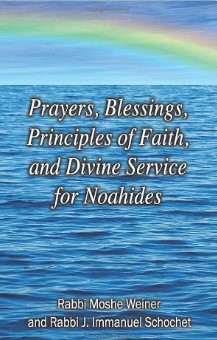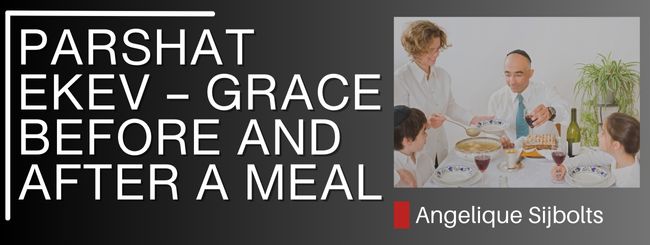בס”ד
Deuteronomy 7:12-11:25 from 30 July till 5 August
This time I was not at home while writing. So, no books to grab. No inspiring people for me to be stimulated by to write something. Just me and my laptop, so what to do now. My eye caught the following verse:
וְאָכַלְתָּ֖ וְשָׂבָ֑עְתָּ וּבֵֽרַכְתָּ֙ אֶת־יְהֹוָ֣ה אֱלֹהֶ֔יךָ עַל־הָאָ֥רֶץ הַטֹּבָ֖ה אֲשֶׁ֥ר נָֽתַן־לָֽךְ׃
When you have eaten your fill, give thanks to your G-d for the good land given to you. (Deutoronomy 8:12)
In the following Midrash, we see that the Torah demands Jews that before putting anything in their mouths, they should pause for a moment, recite a few words, and only then proceed with their eating[1].
Midrash: Ein Yaakov (Glick Edition), Berakhot 7:6
Our Rabbis taught: “Whence do we learn that the after-meal grace is a Biblical law? Is is written (Deu. 8, 10.) When thou hast eaten and art satisfied, then shalt thou bless the Lord, thy G-d. Whence do we learn that we must say a grace before we eat? It is written (Ib. ib.) Which he has given thee, i.e., as soon as he gives you, must you say the grace.”
How about the Noahides? You might say that it is at least appropriate to thank G-d for what you have, because everything comes from G-d.
לְדָוִ֗ד מִ֫זְמ֥וֹר לַֽ֭ה’ הָאָ֣רֶץ וּמְלוֹאָ֑הּ תֵּ֝בֵ֗ל וְיֹ֣שְׁבֵי בָֽהּ׃
Of David. A psalm. HASHEM’s is the earth and its fullness, the inhabited land and those who dwell in it. (Artscroll)
However, there is no obligation for Noahides to say a bracha before eating, and doing so has no negative consequences.. But in Psalm 115:16 we read:
הַשָּׁמַ֣יִם שָׁ֭מַיִם לַיהֹוָ֑ה וְ֝הָאָ֗רֶץ נָתַ֥ן לִבְנֵי־אָדָֽם׃
The heavens belong to the L-rd, but the earth He gave over to man.
Rabbi Levi noted a contradiction between two verses. He resolved the contradiction by stating that one verse refers to the status of the world before reciting a Bracha and the other to after its recitation.[2]
From this, we can draw the conclusion that it is only logical to thank G-d before we eat or drink anything.
But what about the bracha after dinner?
When I was granted the opportunity to visit Hebron, we were offered something small to eat first. Then we were instructed to recite the accompanying bracha. As Abraham educated his visitors. It was a unique experience to be reminded of the Midrash in that specific location::
The Midrash relates that Abraham’s tent was pitched in the middle of an intercity highway, and open on all four sides so that any traveler was welcome to a royal feast. Inevitably, at the end of the meal, the grateful guests would want to thank Abraham. “It’s not me who you should be thanking,” Abraham replied. “G-d provides our food, and sustains us moment by moment. To Him we should give thanks!” Those who balked at the idea of thanking G-d were offered an alternative: Pay full price for the meal. Considering the high price for a fabulous meal in the desert, Abraham succeeded in inspiring even the skeptics to “give G-d a try.”[3]
Again, according to the Midrash, it was not obligatory for Noahides to pronounce the bracha after eating, but I believe many alongside Abraham did so since it made sense.
In the book of rabbi Moshe Weiner, “The Seven Gates of Righteous Knowledge”, we read:
After a person eats a satisfying amount, it is fitting for him to thank G-d for giving him his sustenance. It is customary to recite a prayer of “Grace” after eating a filling meal, but not after eating only a small amount. When saying “Grace After a Meal,” it is proper to include thanks to G-d for providing other necessities – for example, health, livelihood and existence…The original short Grace (as taught by Abraham to his guests)[4] Blessed is the G-d of the universe; from Whose bounty we have eaten.
The brachot that can be said before eating, and the explanation of when which brachot is said for which food can be found in: Prayers, Blessings, and Faith for Noahides – 7th English Edition

You can also watch the Youtube of the blessing on everything
The blessing on the breath
And the Blessing on fruits
Let us all thank G-d for that which He gives us. Either by using the above brachot or by using our own words in our own language to thank Him for His goodness which He gives to us every moment.
By Angelique Sijbolts
Sources:
[1] Chabad article: Why a Blessing?
[2] Noahide Laws by Yeshiva Pirchei Shoshanim (Author)
[3] Aish Article: What is a Bracha? : Midrash Aggada (Genesis 21:33); see also Talmud – Sotah 10b; Midrash Tanchuma (Lech Lecha 12); Midrash Rabba (Genesis 54); Midrash Shochar Tov (Tehillim 110).
[4] Midrash Rabbah Bereishit, ch. 54. See the Preface the book “The Seven Gates of Righteous Knowledge, p. 5.
Texts: Sefaria.org
For the text for the grace after meals you can go to: “grace after meals” from Ask.Noah
© Copyright, all rights reserved. If you enjoyed this article, we encourage you to distribute it further.
